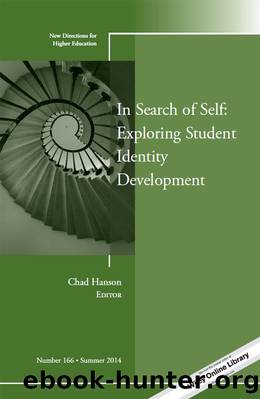In Search of Self by Chad Hanson

Author:Chad Hanson [Hanson, Chad]
Language: eng
Format: epub
ISBN: 9781118915097
Publisher: Wiley
Published: 2014-05-28T00:00:00+00:00
Consequently, they argue that civic education must work to âovercome the individualistic conception of citizenship that underpins much recent thinking in the area of civic educationâ (p. 65).
Joel Westheimer and Joseph Kahne (2004) identify three different âvisions of citizenshipâ found in various civic education programs, each of which suggests a different civic education approach. The âpersonally responsible citizenâ should have individual character traits that make them âhonest, responsible, and law-abidingâ and are best developed through character education and volunteering programs. The âparticipatory citizenâ understands how government works and how to organize and be involved in the process in order to accomplish things with other citizens. Here civic education focuses on helping students figure out how the system operates and how to negotiate it to get things done. Finally, the âjustice-oriented citizenâ is one who has been taught to think critically about the existing system and learns to âquestion, debate, and change established systems and structuresâ (p. 240). It is some combination of the âparticipatory citizenâ and the âjustice-oriented citizenâ that democratic theorists like Dewey (1921) and Pateman (1970) argue is necessary for democracy to thrive. To develop democratic dispositions that incline citizens toward working with others to address problems and injustice, a different kind of civic education is necessary.
This is not to argue that knowledge and cognitive skills are irrelevant to civic education, but only that alone they are not enough to ensure that citizens are democratically engaged. The ability to apply and put to use that knowledge in the community requires a further level of development of what John J. Patrick (2000) calls âparticipatory skills and civic dispositionsâ (p. 4). These civic dispositions include a willingness to promote âthe common good of the community,â to recognize âthe common humanity and dignity of each person,â to participate âresponsibly and effectively in political and civic life,â and to support and maintain âdemocratic principles and practicesâ (p. 5). Richard Battistoni (1997) has argued that education for democracy requires programs that develop âan other-regarding ethic appropriate to democratic citizenshipâ (p. 150).
Research on the construction of civic identities mirrors, and in some cases expands upon, the development of democratic dispositions. Both concepts take a developmental approach, but we might think of civic identity as providing the broader structure within which democratic dispositions are housed. Civic identity is defined as a âsense of connection to and participation in a civic communityâ (Rubin, 2007, p. 450) and âentails the establishment of individual and collective senses of social agency, responsibility for society, and political-moral awarenessâ (Youniss, McLellan, & Yates, 1997, p. 620). The research in this area shows that the development of civic identity occurs through practice and engagement with others and ârequires active reflection, experimentation, and what Dewey called âmoral rehearsalââ (Knefelkamp, 2008, pp. 2â3).
Download
This site does not store any files on its server. We only index and link to content provided by other sites. Please contact the content providers to delete copyright contents if any and email us, we'll remove relevant links or contents immediately.
| Administration | Adult & Continuing Education |
| Business School Guides | College Guides |
| Financial Aid | Graduate School Guides |
| Law School Guides | Medical School Guides |
| Test Preparation | Vocational |
Spare by Prince Harry The Duke of Sussex(5173)
Navigation and Map Reading by K Andrew(5150)
Tuesdays with Morrie by Mitch Albom(4767)
Machine Learning at Scale with H2O by Gregory Keys | David Whiting(4290)
Cracking the GRE Premium Edition with 6 Practice Tests, 2015 (Graduate School Test Preparation) by Princeton Review(4271)
Never by Ken Follett(3931)
Goodbye Paradise(3797)
What It Really Takes to Get Into Ivy League and Other Highly Selective Colleges by Hughes Chuck(3741)
Fairy Tale by Stephen King(3366)
Harry Potter and the Prisoner of Azkaban (Book 3) by J. K. Rowling(3346)
Pledged by Alexandra Robbins(3170)
Kick Ass in College: Highest Rated "How to Study in College" Book | 77 Ninja Study Skills Tips and Career Strategies | Motivational for College Students: A Guerrilla Guide to College Success by Fox Gunnar(3113)
Reminders of Him: A Novel by Colleen Hoover(3074)
A Dictionary of Sociology by Unknown(3070)
Sapiens and Homo Deus by Yuval Noah Harari(3061)
The Social Psychology of Inequality by Unknown(3014)
Graduate Admissions Essays, Fourth Edition: Write Your Way into the Graduate School of Your Choice (Graduate Admissions Essays: Write Your Way Into the) by Asher Donald(2906)
Will by Will Smith(2904)
Zero to Make by David Lang(2776)
